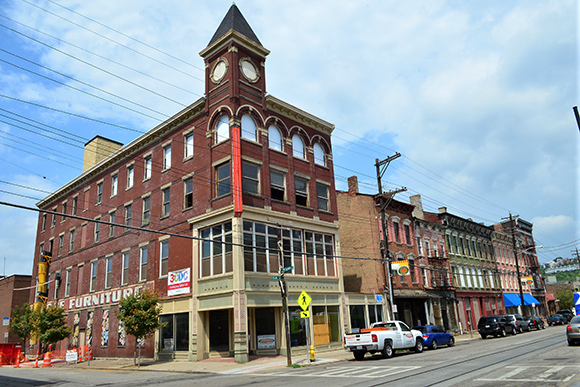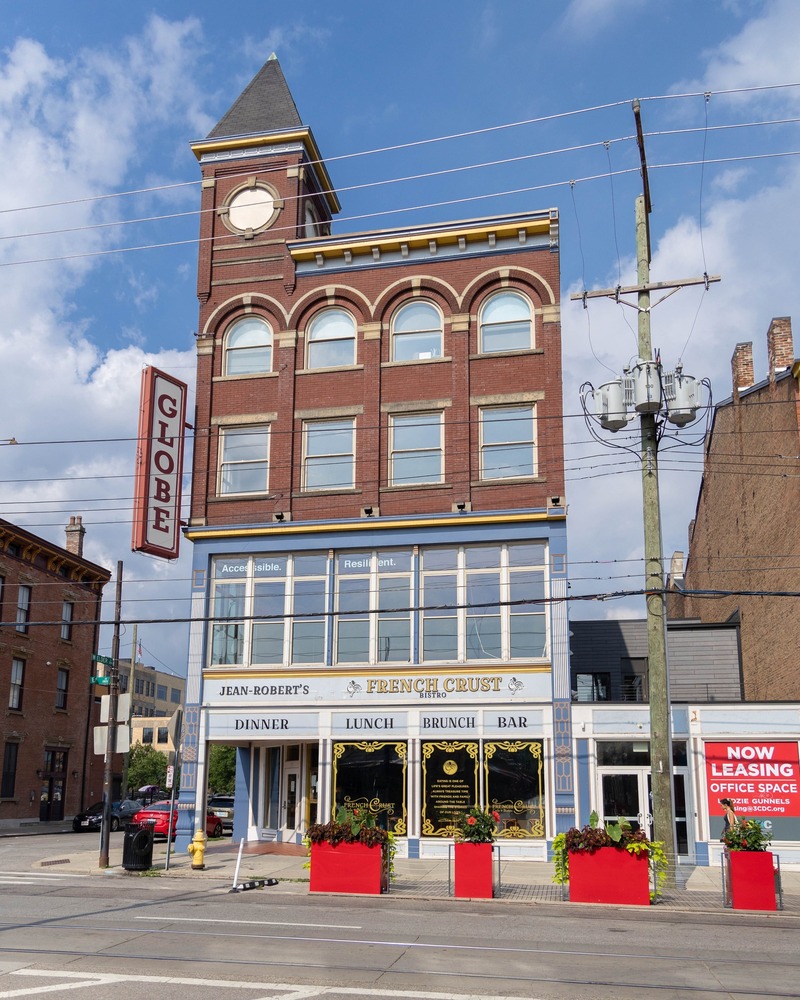The Early Years of 1801-1805 Elm: Coffee, Beer and Hats
In the 1860s, 1801 Elm housed Charles Kennett’s coffee house. Charles Kennett was born in Bavaria in 1823. Married to Margaret, they had just had a son, Edward, upon moving into 1801 Elm. By 1864, Charles and his family moved to Hamilton Road where he ran a saloon. At the end of the Civil War, Henry Osege used both storefronts for his coffee house. Within a year of operation, Henry joined hundreds of other men in Over-the-Rhine in opening a saloon. From 1866 into the 1870s, Henry Osege ran his saloon out of 1801 Elm.
In the late 1870s, 1801-1803 Elm transformed into a boarding house under the management of Jacob Hoefle. Jacob and his young family had lived at 1805 Elm for much of the 1870s. There, he had worked as a photographer while his wife Louisa was employed in the hat-making trade. In 1880, Jacob transferred his energy to a new business idea: organizing a millinery operation at 1801-1803 Elm. In the late 1800s, work in the garment industry in Cincinnati employed hundreds. While women like Louisa comprised the majority of the workforce, either working out of their home or out of a shop, men were often the managers of the various clothing and hat-making companies. By 1883, Jacob abandoned running his own hat-making shop and turned to electrician work. The family moved to Clifton, yet Louisa continued to return to 1801-1803 Elm to work at Misses S & P’s new millinery shop.
Misses S & P’s was run by Sophia Siehl and her partner Amelia Peal. Their millinery business at 1801-1803 Elm lasted from the mid-1880s until the turn of the 20th century. Sophia, born in 1854 in Baden, had immigrated to the U.S. in 1867 with her parents Friedrich Siehl and Eva Catharina. Her older sister Magdalena worked for Misses S & P for most of her life. Born in 1862, Amelia Peal was born in Cincinnati to Prussian parents John and Mary. Like Sophia, she never married. While Sophia lived at 1805 Elm for much of her life, Amelia resided with her parents at their home on West Liberty as she aged.
In 1893, George Slimer purchased 1801-1803 Elm. George and his son George were well-known men in the meat-packing industry in Cincinnati. George Sr. was a prosperous butcher from Alsace-Lorain who came to Cincinnati as a ten-year-old. A Civil war veteran, he owned a slaughterhouse at Elm and Findlay and was one of the founders of Cincinnati Union Stock Yards. The father George served on the Chamber of Commerce and all of his children wed individuals connected to major Cincinnati industries. After George Sr.’s death in 1893, his son continued the family’s pork-packing business, Slimer & Dater, and its real estate empire. George Slimer did not hold onto 1801-1803 Elm for very long.
The Beginning of the Furniture Era: Scheve & Angert
In 1896, Joseph Scheve and George Angert purchased the plot of land on which the buildings stood. Scheve and Angert were already furniture manufacturers looking for a new and large site for their business. They bought the two wood-frame structures at Elm and Elder and demolished them. Displaced by the demolition at 1801-1803 Elm, Misses S & P moved their business next door to 1805 Elm where they continued their operation until the 1930s. By the 1920s, many of the women managing the operation began to pass away at their old ages. With their deaths, Misses S & P at 1805 Elm ended.
After the razing of the original 1801-1803 Elm in 1896, Joseph Scheve and George Angert built what stands now; the brick Globe Building. From the turn of the 20th century until the Great Depression, Scheve & Angert sold furniture, carpets, appliances and other household goods at the new 1801-1803 Elm. A second-generation German immigrant, Joseph Scheve married Katherine and had several children with her. Katherine gave birth to eight children in total yet one died young. Later in life, their daughter Zita made waves in Cincinnati for her work as the only female broker at W.D. Gradison Co. at the Dixie-Terminal Building in the mid-20th century, very much a man’s world. In the summer of 1921, 1801-1803 Elm was almost destroyed. On the evening of June 19, 1921, thieves broke into the building and, frustrated when they could not open the company safe, left a mysterious liquid in the office. Discovered the next morning, Scheve & Angert management took the liquid to city chemist Otto P. Behrer to test. When Otto heated the liquid at City Hall to ascertain its make-up, it caused a great explosion as it contained nitro-glycerin. Sadly, Scheve & Angert’s tenure at 1801-1803 Elm ended in 1930 when Joseph Scheve, who had been struggling with mental illness, committed suicide at his home. Thereafter, George Angert and his family moved to Komoko, Indiana.
The Furniture Era: The Leugers Furniture Co.
After the Scheve & Angert Company, George A. Leugers and then his son George H. Leugers ran their high-end furniture store at 1801-1803 Elm from February 1, 1930 their official beginning date until the late 1950s. George A. Leugers was born in 1862 in Fuersteneau in what is now Germany. After immigrating in 1881, he and his wife Philomena started a family, eventually having eight children, three of whom lived past childhood. George worked as a cabinet maker for a living and raised his family in Over-the-Rhine on Woodward Street. His son, George H. Leugers, was born February 24th, 1891. The two of them went into business together as George A. aged.
In 1903, Leugers Furniture officially began but it was not until the Great Depression that they used 1801-1803 Elm for this business. In its early years, the business sold furniture yet soon the Leugers diversified to stocking rugs, carpets and other floor coverings as well as radios, refrigerators, ranges and other modern appliances. The Leugers took to heart the furniture business. George H. became involved in the Queen City Furniture Club and later the Retail Furniture Association of Greater Cincinnati.
These professional organizations in the early to mid-20th century operated much like a union and allowed members to organize against threatening and changing business trends, including, in the words of Cincinnati furniture dealers in the early 1900s, “the inroads of mail order houses” and “selling to a wouldbe customer who is unable to pay.” As more and more customers and even other furniture stores bought pieces on credit, honest furniture dealers feared the loss of profit when someone was actually not good for their money. The Leugers family did well for itself. In the early and mid-20th century, Leugers’ Furniture had two other locations in addition to its Elm Street one: in Elmwood Place and in Reading. In the early spring of 1924, the Elmwood Place site caught fire, causing extensive damage. The Leugers family recouped its losses, rebuilt and maintained the various sites for the business, eventually expanding to more sites.
The Furniture Era: Globe Furniture
In 1956, 1801-1803 was sold to Elm to Harry L. and Rose Meissel. George H. passed away in 1977 and was buried at Gates of Heaven Cemetery in Montgomery. His wife Louise lived until 1992, and she was buried next to her husband. Under the direction of George Jr., George H.’s eldest son, the Leugers Furniture store continued outside of the Elm and Elder address. Harry L. Meisel and Rose married on Christmas 1927. Though born in Batesville, Indiana, Harry grew up in Covington, raised by his Jewish parents. His father Michael and mother Agnes had immigrated in the 1880s from Poland. His father worked as a rag dealer; his mother Rose, born in Chickasha, Oklahoma, also came from a Russian background. After marrying in 1927, Harry and Rose started a family in Cincinnati: their son Alvin “Bunny” was born in 1928. The young family moved to Covington at the time, and while it was the Great Depression, Harry successfully owned an antique shop on E. Pearl Street in downtown Cincinnati which his son Alvin, as he aged, assisted at.
During World War II, antiques were a hard commodity to come by, so Harry and Rose switched to selling new furniture. In 1955, they moved into 1801-1803 Elm with their Globe Furniture business, thus giving the building its present moniker of “the Globe Building.” In addition to furniture, appliances were also sold at the Elm Street store. Seeing their shop as part of Findlay Market, Harry served on the Findlay Market Association and, like the Leugers, was a part of industry organizations including the Home Furnishing Association. Harry Meisel passed away in 1972. Thereafter, his son Alvin took over the family business. Widowed Rose eventually remarried, this time to Nathan Gilhooley. She passed away in 2006 and was buried at Beth Tefyla Schachnus Cemetery with her first husband. In 1984, Alvin built a two-story, 25,000 SQFT, $1-million addition to Globe Furniture behind the building along Elder Street.The new showroom was connected to the main Globe building by a twelve-foot-wide skywalk. When asked why he was investing more in that specific location in Over-the-Rhine when OTR was losing population quickly, he replied, “Over-the-Rhine can explode. It can be good, not only for housing, but as a total service center for downtown.” The Meisel family, specifically Alvin’s daughter Karen and her husband David, owned the Globe Building until the early 2000s. Keeping retail business in the family, Karen eventually became Macy’s chief financial officer until her retirement in 2018. Most recently, after a renovation by 3CDC, the Globe Building has become home to People’s Liberty and to Jean-Robert de Cavel’s French Crust Cafe in the first-floor commercial space.

